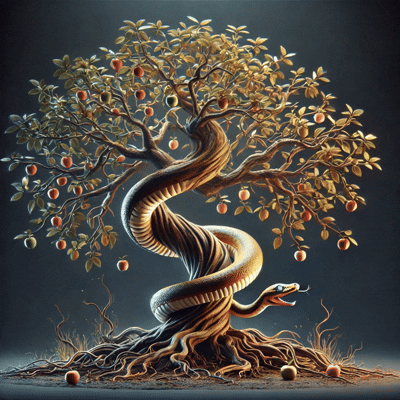Understanding Gnosticism: An Ancient Path to Divine Knowledge
What is Gnosticism?
Gnosticism (from the Greek gnosis, meaning "knowledge") represents not a single unified religion but a diverse collection of ancient spiritual movements that flourished alongside early Christianity and Judaism during the first through third centuries CE. These traditions share a revolutionary cosmological vision that challenges conventional religious assumptions about God, creation, and salvation.
Read the full article
Vice and Immorality
We take a nuanced position on vice and morality, viewing sin not merely as a transgression against divine law, but as an error in judgment. Traditionally, sin encompasses vices such as pride, greed, wrath, envy, lust, gluttony, and sloth. While these activities can be part of the human experience, our focus is on the potential harm they may pose when left unchecked. Errors in judgement are pervasive in contemporary society, often manifesting through acts such as excessive indulgence in sex, gambling, drugs, food, revenge, etc. While these pursuits might not all seem harmful to others, we are warned that those who engage in them can suffer detrimental effects on their well-being, moral integrity, and spiritual soul.
We are not perfect, nor do we try to be because, we don't even know what that means. We are human and to be human means some dark truths. Humans have the capacity for great evil including demonic cruelty and heartless slaughter. We who look are aware of the evil within us. We seek the light and redemption. We believe in Jesus Christ the Savior.


Salvation
On one occasion an expert in the law stood up to test Jesus. “Teacher,” he asked, “what must I do to inherit eternal life?”
“What is written in the Law?” he replied. “How do you read it?”
He answered, “Love the Lord your God with all your heart and with all your soul and with all your strength and with all your mind; and ‘Love your neighbor as yourself.’”
“You have answered correctly,” Jesus replied. “Do this and you will live.” Luke 10:25-35
Conclusion
In Mattew 7:13 Jesus tells us, “Enter through the narrow gate. For wide is the gate and broad is the road that leads to destruction, and many enter through it. But small is the gate and narrow the road that leads to life, and only a few find it."
Mattew 7:21-23 “Not everyone who says to me, ‘Lord, Lord,’ will enter the kingdom of heaven, but only the one who does the will of my Father who is in heaven. Many will say to me on that day, ‘Lord, Lord, did we not prophesy in your name and in your name drive out demons and, in your name, perform many miracles?’ Then I will tell them plainly, ‘I never knew you. Away from me, you evildoers!’

Learn about Angels
Angels: Divine Messengers and Celestial Beings
Throughout history and across various religious and cultural traditions, angels have been depicted as divine messengers, guardians, and celestial beings who act as intermediaries between God and humanity. These ethereal figures are often associated with light, purity, and wisdom, serving as symbols of hope, protection, and divine guidance. Whether portrayed as warriors of justice, bearers of important revelations, or compassionate guides, angels hold a revered place in Christian theology, as well as in other Abrahamic religions and spiritual beliefs.
The Nature and Purpose of Angels
In Christian tradition, angels are seen as spiritual beings created by God to serve His divine will. Unlike humans, they are considered immortal and free from sin, existing in a heavenly realm while occasionally intervening in human affairs. The Bible describes various roles for angels, from announcing significant events to providing comfort and protection. For instance, in the Old Testament, angels appear to figures like Abraham, Moses, and Daniel, offering guidance and carrying out divine commands. In the New Testament, the angel Gabriel delivers the news of Jesus' birth to the Virgin Mary, reaffirming their role as messengers of God.
Angels are also believed to serve as protectors of individuals and nations. The concept of guardian angels is widely embraced, suggesting that each person has an angel assigned to watch over them. This belief provides a sense of reassurance and divine presence in daily life. Additionally, angels play a significant role in the spiritual battle between good and evil, as exemplified by the archangel Michael leading God’s armies against Satan in the Book of Revelation.
The Hierarchy of Angels
Christian theology, particularly within Catholic and Orthodox traditions, classifies angels into a hierarchical order. This classification is largely derived from the writings of early Christian scholars, such as St. Thomas Aquinas, who described the “Nine Choirs of Angels.” These choirs are divided into three spheres:
First Sphere (Closest to God): Seraphim, Cherubim, and Thrones. These angels worship and glorify God, with Seraphim being the highest-ranking, described as beings of immense light and fire.
Second Sphere: Dominions, Virtues, and Powers. These angels govern the natural order and oversee the workings of the universe.
Third Sphere (Closest to Humans): Principalities, Archangels, and Angels. This group includes guardian angels and messengers like Gabriel and Michael, who directly interact with humanity.
Angels in Different Religious and Cultural Beliefs
While Christianity has a well-defined understanding of angels, similar beings exist in other religions and cultures. In Judaism, angels serve as messengers of God, often appearing in the Torah and rabbinic literature. In Islam, angels are a fundamental part of belief, with figures like Jibril (Gabriel) delivering revelations to the Prophet Muhammad. Other traditions, including Zoroastrianism and various esoteric beliefs, also depict angelic beings as divine helpers and cosmic forces of good.
Beyond religion, angels have captured the imagination of artists, writers, and filmmakers. From Renaissance paintings depicting winged seraphim to modern literature and films exploring their roles as supernatural guardians, angels continue to inspire awe and curiosity.
Conclusion
Angels remain a profound and enduring symbol of faith, hope, and divine intervention. Whether seen as protectors, messengers, or warriors, their presence in religious texts and cultural narratives reinforces humanity’s longing for guidance and reassurance in times of uncertainty. While their true nature remains a mystery, the belief in angels continues to provide comfort and inspiration to those who seek a deeper connection with the divine.

Bible Study
Coming soon ...
info@churchofwambo.org
© SDBEST LLC, 2025. All rights reserved.
